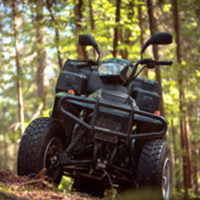Haphazard Industry Safety Standards for Recreational Off-Road Vehicles
June 5, 2019 The Consumer Product Safety Commission (CPSC) has had recreational off-road vehicles (ROV) on its radar for the past 10 years. However, after a recent string of debilitating injuries and fatalities related to unsafe or defective ROVs, the agency wants Americans to remember just how dangerous – and deadly – these vehicles really are.
The Consumer Product Safety Commission (CPSC) has had recreational off-road vehicles (ROV) on its radar for the past 10 years. However, after a recent string of debilitating injuries and fatalities related to unsafe or defective ROVs, the agency wants Americans to remember just how dangerous – and deadly – these vehicles really are.
What Are Recreational Off-Road Vehicles, Or ROVs?
As with all kinds of vehicles, some are safer than others. ROVs are motorized vehicles with four (or more) tires designed for off-road, recreational use. Some recreational off-road vehicles can reach speeds greater than 30 mph.
ROVs are usually open, which means that drivers and passengers face the risk for catastrophic injuries resulting from:
- Occupant ejection;
- Vehicle rollover, and;
- Injuries associated with not wearing a helmet and/or seatbelt
Because of the dangers associated with recreational off-road vehicles, the CPSC requires manufacturers to follow certain safety standards. Some examples of these standards are installing effective restraint systems and rollover protective systems, or ROPS. Despite having these requirements in place, defective and unsafe off-road vehicles continue to make their way onto the consumer market.
ROV Injury and Fatality Data
The CPSC does not analyze the number of injuries and deaths associated exclusively with recreational off-road vehicles (as opposed to all-terrain vehicles, or ATVs), so it is impossible to know the exact number. That said the Consumer Federation of America (CFA) does track off-highway vehicle deaths, which includes ROVs. In 2017, the CFA identified 509 fatalities – and 26% (or 130) took place on recreational off-road vehicles.
Unfortunately, the CFA is a much smaller agency with far fewer resources than the CPSC, so even its data is inconclusive. While much is still unknown when it comes to the exact number of people injured in recreational off-road vehicles accidents, there is data on the most common injuries. Some examples of these include:
- Head injuries, such as traumatic brain injuries (TBIs) and/or concussions;
- Fractures and dislocations;
- Spinal cord injuries
Children and teens are more likely to be involved in recreational off-road vehicle accidents, and accidents are more common in the spring and summertime.
Polaris’ Recreational Off-Road Vehicles and Consumer Dangers
Polaris is a major recreational off-road vehicle manufacturer, and our firm has written several blogs on recalls associated with their ROVs. Polaris has been forced to recall numerous off-road vehicle models in the last six years alone, yet they are still in business and making money while unsuspecting consumers remain vulnerable to extensive product dangers.
Polaris brand ROVs have been involved in hundreds of fires and at least one death. The company has complied with the CPSC’s recalls (and recently agreed to pay more than $27 million in a civil penalty lawsuit), but that highlights the crux of the problem: the safety standards that govern recreational off-road vehicles are ineffective and fail to protect consumers.
When it comes to which agency makes the rules concerning recreational off-road vehicle use, it gets complicated. There are two main agencies that come into play with vehicle safety: the CPSC and the National Highway Traffic Safety Administration, or NHTSA. But neither of these agencies have the authority to tell people where they can – or cannot – operate their ROVs, which means it gets left up to local and state governments.
The laws on using recreational off-road vehicles vary all across the country, but it is clear that consumers need to be much better protected. If you have questions about injuries you sustained while using a recreational off-road vehicle, a staff member at our firm can help. Whether you were injured because of a defective Polaris recreational off-road vehicle or another make and model, please contact us.
Philadelphia Products Liability Lawyers at Galfand Berger, LLP Represent Injured Individuals
If you were injured or became ill because of an unsafe or defective product, please contact the Philadelphia products liability lawyers at Galfand Berger. With offices located in Philadelphia, Bethlehem, Lancaster, and Reading, we serve clients throughout Pennsylvania and New Jersey. To schedule a consultation, call us at 800-222-8792 or complete our online contact form.
 Google Screened
Google Screened
